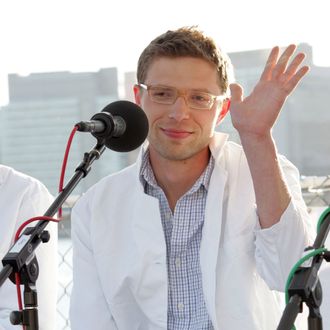
It became glaringly apparent yesterday that The New Yorker’s big-name new hire Jonah Lehrer has often reused his own work, word-for-word, for publications including Wired, The Wall Street Journal, and The New York Times Magazine, as well as in his books How We Decide and Imagine: How Creativity Works. After it was first noted by Romenesko, examples piled up here on Daily Intel and across the web, leading to Editor’s Notes on all of Lehrer’s blog posts for NewYorker.com so far, apologizing for the duplications. “Jonah is aware that he made a mistake,” the magazine’s web editor told Intel, and as of today, Lehrer’s fate at the magazine remains uncertain.
But increased scrutiny on the popular science writer’s work continues to turn up more examples of self-plagiarism, as well other journalistic missteps, such as issues with attribution.
The blog Reluctant Habits has an extensive rundown of Lehrer recycling his words, with huge chunks of his writings at Wired, The New Yorker, and The New York Times Magazine reappearing almost exactly in his new book, Imagine. Sometimes paragraphs even appear in three locations, without the repetition ever being noted.
But potentially more problematic is Lehrer’s use of others’ words and ideas, such as this paragraph from Malcolm Gladwell, as spotted by Edward Champion:
Malcolm Gladwell, “The Formula.” The New Yorker (October 16, 2006): “One of the highest-grossing movies in history, ‘Raiders of the Lost Ark,’ was offered to every studio in Hollywood, Goldman writes, and every one of them turned it down except Paramount: ‘Why did Paramount say yes? Because nobody knows anything. And why did all the other studios say no? Because nobody knows anything. And why did Universal, the mightiest studio of all, pass on Star Wars? … Because nobody, nobody — not now, not ever — knows the least goddamn thing about what is or isn’t going to work at the box office.’”
Jonah Lehrer, Imagine, p. 144: “For instance, one of the highest-grossing movies in history, Raiders of the Lost Ark, was offered to every studio in Hollywood, and every one of them turned it down except Paramount: ‘Why did Paramount say yes?’ Goldman asks. ‘Because nobody knows anything. And why did all the other studios say no? Because nobody knows anything. And why did Universal, the mightiest studio of all, pass on Star Wars … ? Because nobody, nobody — not now, not ever — knows the least goddam thing about what is or isn’t going to work at the box office.’”
As we pointed out yesterday, an earlier Lehrer story for The New Yorker comes amended with an Editor’s Note clarifying that comments Lehrer quoted from Noam Chomsky were not made to him, but to another journalist. Additionally, a review of Lehrer’s book How We Decide from 2009 in Columbia Magazine notes (emphasis ours):
Despite Lehrer’s agile handling of a lot of complicated material, I never was quite sure about the line that separated his reporting from other people’s work. Lehrer’s account of the disastrous 1949 firefighting episode in Montana, for example, with which he began his July 2008 story about insight in the New Yorker, apparently represents no original reporting, but instead is an elaborate four-page retelling of Norman Maclean’s Young Men and Fire (1992).
Lehrer mentions the Maclean book in the main text, yet oddly doesn’t attribute his very detailed account to it. This and other derivative anecdotes are written with such immediacy and visceral detail that it is the kind of prose we normally associate with eyewitness reporting or fastidious, scrupulously sourced reconstruction. At minimum, it would have been gracious to acknowledge Maclean explicitly in the text as the main source of Lehrer’s extended, vivid account.
Similarly, a New Republic review of Lehrer’s new book, Imagine, reads, “Borrowing (heavily) a page from Edward Glaeser, Lehrer is a cheerleader for cities because they allow different kinds of people to interact with one another.”
“For a writer as prolific as Lehrer, reusing a phrase every so often may be unavoidable. But why would a writer as accomplished as Lehrer become this much of a copy/paste addict?” Josh Levin writes at Slate. “Because he has ceased to be a writer. With the success of his recent books How We Decide and Imagine: How Creativity Works, Lehrer has moved into the idea business.” But who owns some of those ideas is also now up for debate.
We’ve reached out to The New Yorker about Lehrer’s future there and will update when we hear back.
Update: Lehrer tells the New York Times culture blog ArtsBeat, “It was a stupid thing to do and incredibly lazy and absolutely wrong.” His editor adds that Lehrer still has his job as of Wednesday afternoon and reiterated, “This is wrong. He knows it’s a mistake. It’s not going to happen again.”
Lehrer’s book publisher put out their own statement: “Jonah Lehrer fully acknowledges that Imagine draws upon work he has published in shorter form during the past several years and is sorry that was not made clear. … He owns the rights to the relevant articles, so no permission was needed. He will add language to the acknowledgments noting his prior work.”





























